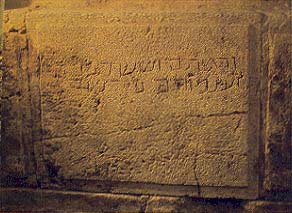Image Details

Meir Ben-Dov
Silent testimony to hopes of rebuilding the Temple. Carved into a wall of the Temple Mount in the fourth century, this Hebrew inscription, a variant of Isaiah 66:14, bespoke the mood of optimism that the Temple would soon be rebuilt: “And when you see this, your heart shall rejoice, and their bones shall flourish like an herb…”
In 361, Julian, a Hellenist, was emperor. Working to restore religious freedom to the Roman empire, Julian encouraged the Jews to return to Jerusalem and rebuild the Temple. But Julian was killed in 363, and his successor, Jovian, once again aligned the Empire with Christianity. The prophecy of Isaiah was not realized.
